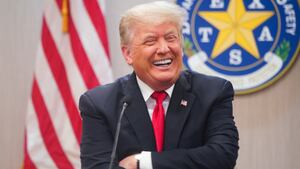The Supreme Court ruled in a 6-3 decision on Monday that President Donald Trump enjoys at least some immunity from criminal prosecution. And while the conservative justices did not agree with the former president’s broader definition of immunity, they still largely left him off the hook.
In a post on Truth Social, the former president called the decision a “BIG WIN.”
“Trump asserts a far broader immunity than the limited one the Court recognizes, contending that the indictment must be dismissed because the Impeachment Judgment Clause requires that impeachment and Senate conviction precede a President’s criminal prosecution,” Chief Justice John Roberts wrote in his opinion.
The decision effectively kicks the question back down to the Washington D.C. District Judge Tanya Chutkan to hear arguments over what constitutes an official act by the former president.
“We conclude that under our constitutional structure of separated powers, the nature of Presidential power requires that a former President have some immunity from criminal prosecution for official acts during his tenure in office,” Roberts wrote.
In her dissent, Justice Ketanji Brown Jackson said “the seeds of absolute power for Presidents have been planted” and “absolute power corrupts absolutely.”
Luxury RV-loving Justice Clarence Thomas went rogue in a concurring opinion in which he called into question whether the U.S. should have people appointed to special counsel positions investigating presidents at all.
“If there is no law establishing the office that the Special Counsel occupies, then he cannot proceed with this prosecution,” Thomas wrote. “A private citizen cannot criminally prosecute anyone, let alone a former President.”
The majority decision left questions around the president’s motive outside the scope of immunity, denying Special Counsel Jack Smith’s broader argument that Trump’s use of the Department of Justice while in office to try and overturn the 2020 election results could be prosecuted. Instead, the court ruled that his use of the department constituted an official act and therefore cannot be prosecuted.
However, the district court can still determine whether other actions he took around the January 6 insurrection would be unofficial acts and therefore eligible for prosecution.
The net effect of the decision is further delay: both for the D.C. case as well as the Florida classified documents case, making both even more unlikely to be decided before the November election.






